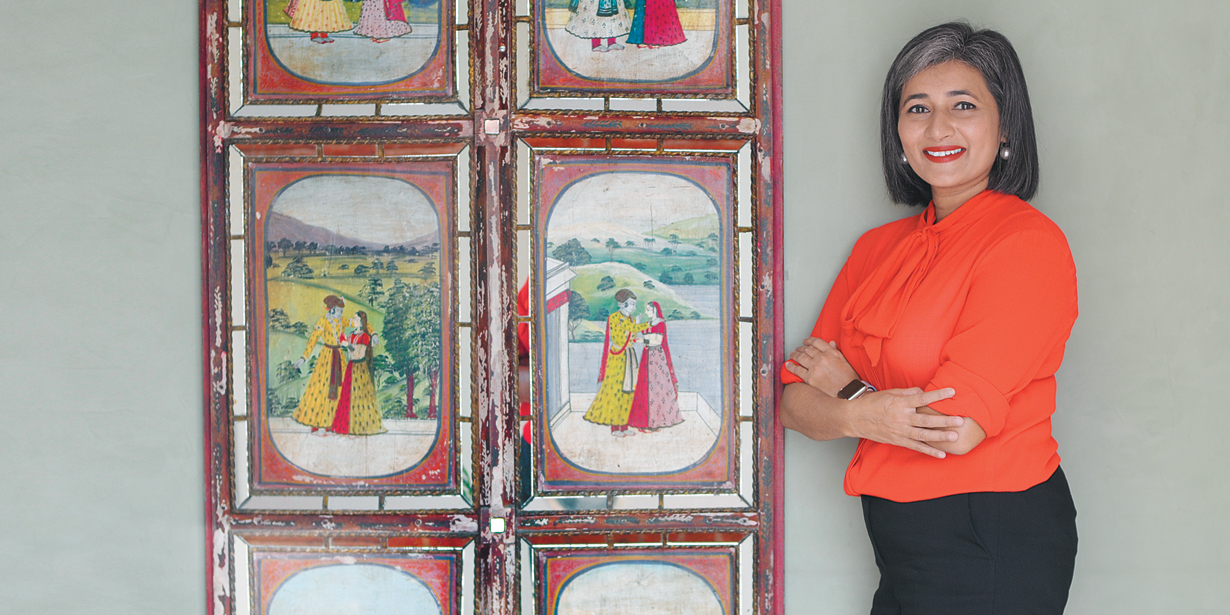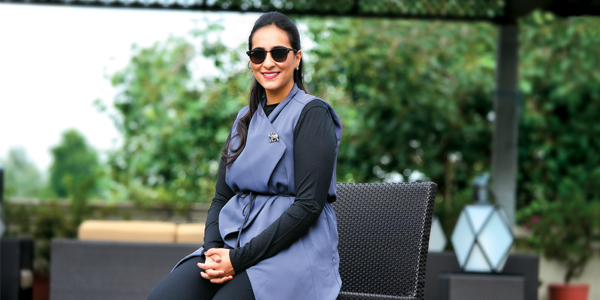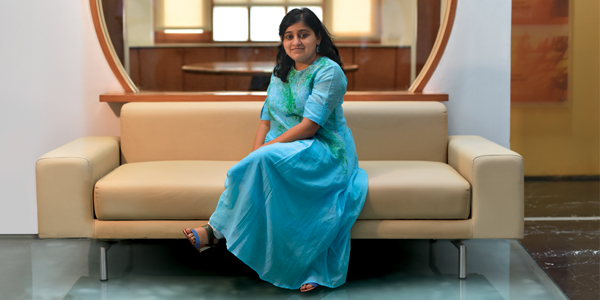The “Beverage Baroness” behind Parle Agro’s soaring market share against stiff competition: Meet Schauna Chauhan
After learning every nuance of the business from her dad, Schauna Chauhan has drawn up her own ambitious blueprint for Parle Agro
The colour pencil marks on the wall and the large sofa does not really give the impression of a meeting room. The petite Schauna Chauhan is quick to notice the curiosity on our faces before breaking into a wide smile. “This is the handiwork of my son. He comes by in the afternoon after school,” she says. Jahaan, the four-year-old, is the apple of his mother’s eye and she clearly can’t have enough of him. He visits her in the office after the workaholic mother, by her own admission, is done by 6.30 PM. Chauhan is at her desk by 8.30 AM and often begins her day with an early morning meeting. Wearing several hats — boss, daughter, mother, and wife — is something most working women are adept at; Chauhan is no exception.
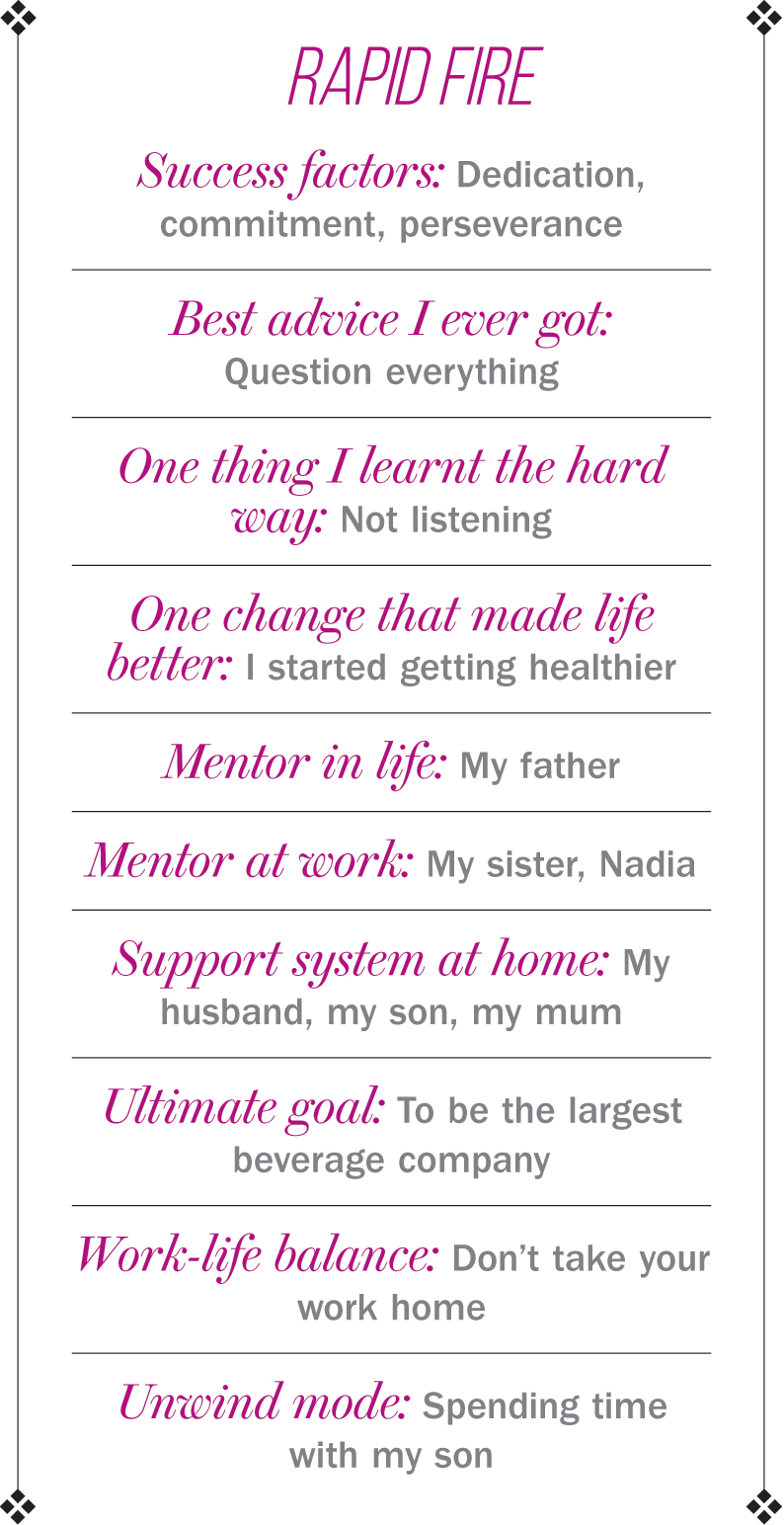 As the first-born to Prakash Chauhan, the 41-year-old has a job on her hands in a hyper-competitive market where her brands such as Frooti, Appy and Bailey are up against other nimble-footed Indian rivals and the deep-pocketed multinationals. But it is not something that worries her. “One has to be aware of competition but it is more important to focus on what one is doing. I like to compete with myself,” she says calmly.
As the first-born to Prakash Chauhan, the 41-year-old has a job on her hands in a hyper-competitive market where her brands such as Frooti, Appy and Bailey are up against other nimble-footed Indian rivals and the deep-pocketed multinationals. But it is not something that worries her. “One has to be aware of competition but it is more important to focus on what one is doing. I like to compete with myself,” she says calmly.
Having taken over as the CEO of Parle Agro in 2006, Chauhan works closely with her top team and her two sisters. Responsibilities are clearly divided between the siblings, with each focusing on their strength. While Chauhan takes scare of manufacturing, compliance, quality, finance and technical functions, her younger sister, Alisha oversees the CSR work. Nadia, the youngest of the three, is in charge of strategy, sales and marketing and R&D. “My sisters are my back up and I can rely on them for anything,” she describes.
Cutting her teeth
Having such a well-known surname ought to have been an advantage and the lady does admit it. “I do take advantage of it sometimes at work when I want something done or even to reach out to a person outside. Just saying Schauna does not work always,” she says as she breaks into a laugh. “On a serious note, the Parle Agro name is really the clincher, it opens a lot of doors and that is a constant realisation of how strong the brand is.”
When Chauhan was 12, she was sent to a boarding school in Kodaikanal, which remains unforgettable. “I really blossomed there and got interested in sports and music. It broadened my mind, which would not have been possible in Mumbai,” she thinks. Other memories are of being a prankster, with her parents soon getting a note from the school authorities. “My mother was called in by the Principal. I wish I could tell you what it was all about,” she says with a mischievous smile.
Chauhan was always clear she would be joining the family business in Mumbai. Since that decision, she moved to Franklin College in Switzerland in 1995 for a degree in international management. “That experience of meeting people from across the world was very special,” she reminisces. A day after classes were done, she was airborne to Mumbai to start work at Parle Agro.
A big source of comfort was in having her father oversee her in the early days. “He was fully involved in the business. I was only 22 and spent a lot of time watching him in meetings,” she describes. Chauhan’s job title was executive (operations) then. One of the memories from that phase, she remembers, is endlessly signing vouchers.
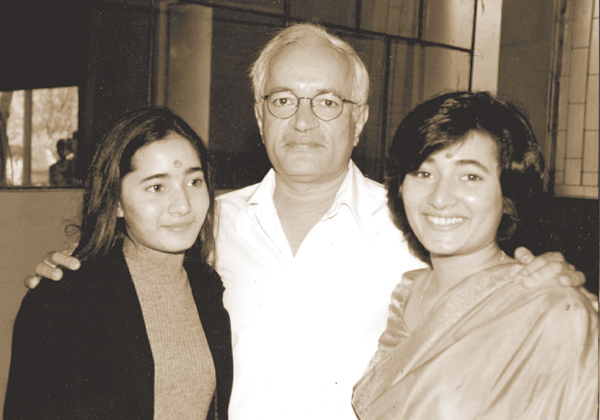 Though there was no formal reporting to her father, Chauhan made it a point to chat with him religiously over lunch. “It could have been about labour negotiations, capacity constraint or a greenfield project. There was never really an agenda but I was with him most of the time,” she explains. That stint lasted for about two years before the family split in 2001. Chauhan does not remember much from that except having to do up the office building that she currently sits in. “Things were moving so quickly that I had very little time for anything else,” she recalls.
Though there was no formal reporting to her father, Chauhan made it a point to chat with him religiously over lunch. “It could have been about labour negotiations, capacity constraint or a greenfield project. There was never really an agenda but I was with him most of the time,” she explains. That stint lasted for about two years before the family split in 2001. Chauhan does not remember much from that except having to do up the office building that she currently sits in. “Things were moving so quickly that I had very little time for anything else,” she recalls.
In her mind, none of her colleagues viewed Chauhan differently just because she was the boss’ girl. “My father always watched what I was doing. When I came up with an absurd idea, he would very politely ask me to “focus” on work,” she narrates. Two gems that she picked up from him during that phase still mean a lot to her. One was the emphasis on understanding the business and grasping every nuance. “The other thing was to go along with my sisters,” Chauhan recalls him saying. “The job cannot be done alone and you will have to work with them all the time.”
One of her father’s traits that she admires is his quest for reason in everything. “He is always questioning things and that bit about probing is something I have picked up too. It helps in getting to the root cause and makes the process of understanding better,” thinks Chauhan. Much of that, in her view, can come only from meeting more people and not getting bogged down by daily responsibilities. Narrating an instance to drive home this point, she speaks about chatting with one of the company’s carton manufacturers last year. A casual conversation turned deeper with her trying to understand the business in more detail. “We figured that our cartons could be redesigned, saving us more than a couple of crores. We got cracking immediately and that was possible only because of our desire to reach out to more folks in the business.”
Chauhan’s stint as the executive director saw Frooti’s market share to bounce back in 2004. The beverage was under pressure because of the onslaught from Slice, when her team decided to launch a 65 ml triangular pack for the rural market to increase consumption. It was an instant hit that increased the product reach as well as outlet base by 30%. This was a critical phase since there was a high level of dependence on just Frooti.
The following year, Appy Fizz was launched, which managed to create a niche as a sparkling apple drink. Both Appy and Frooti now have a market share of 24% and 46% in their respective apple and mango categories in Fruit Flavoured Still Drink. But Chauhan is not happy with status-quo and now dreams of making Parle Agro one of the largest beverage companies in the country.
The best and worst of times
She credits a lot of the success to her family and also the teams she has worked with over time. If her father was the mentor at work, Chauhan says her mother was the one who always encouraged the girls. Her message was clear — you are blessed with a surname but do not take anything for granted. “It helped that I had a very normal childhood and money was never discussed at home. I think my mother managed to give us that balance without saying very much.”
In late 2004, she married actor and model, Bikram Saluja. Chauhan describes him as an open-minded person and flexible as well. “We hit it off quite early and I liked him. He has been a great support and is someone with an independent mind,” she says.
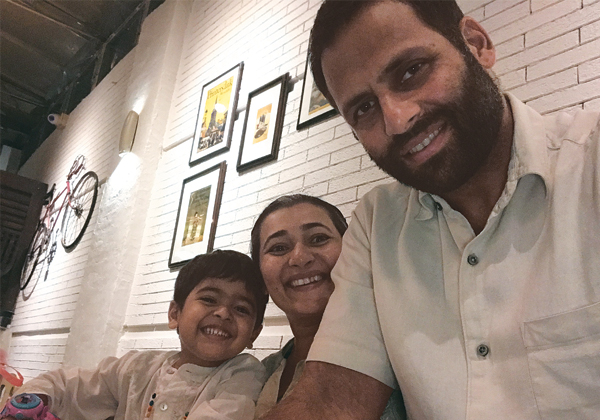 While it has been a great run for her professionally, there have been moments of despair. She speaks of the period around 2002-03 right after the split in the family. The restructuring that followed was stressful. By this time, the large brands such as Thums Up and Gold Spot were sold to Coca-Cola. “The organisation had to be rebuilt and it was a critical period. Everything till then had come to us, and now we had to work many times harder,” says Chauhan, adding that there was a huge focus on cost optimisation and increasing productivity. “That period made me tougher as a person and professional,” she says. At that point, the company exported to just the US and Dubai. Now, its products are sold in 50 countries. From a turnover of Rs.450 crore in 2008, Parle Agro is today a Rs.1,600 crore company.
While it has been a great run for her professionally, there have been moments of despair. She speaks of the period around 2002-03 right after the split in the family. The restructuring that followed was stressful. By this time, the large brands such as Thums Up and Gold Spot were sold to Coca-Cola. “The organisation had to be rebuilt and it was a critical period. Everything till then had come to us, and now we had to work many times harder,” says Chauhan, adding that there was a huge focus on cost optimisation and increasing productivity. “That period made me tougher as a person and professional,” she says. At that point, the company exported to just the US and Dubai. Now, its products are sold in 50 countries. From a turnover of Rs.450 crore in 2008, Parle Agro is today a Rs.1,600 crore company.
As far as her transition to the CEO’s role is concerned, Chauhan explains that belonging to a promoter family had instilled the levels of accountability in her. Working alongside her father meant that she was given more responsibilities, and only when she began feeling more confident in her own decisions that she stopped approaching him for advice, she reveals.
As the boss, she maintains her biggest strength is that she doesn’t go around in circles. “You ask me a question and you will get a straight answer. I will say it as it is without hiding anything,” she elaborates. That worked well for her company, especially as it helps in bringing in clarity and direction to every issue. That trait is useful when it comes to dealing with bad news, which Chauhan says, she is “excellent” at. “What irritates me is terrible news not conveyed to me at the time the issue is building up, but brought to my notice when it becomes a crisis,” she explains. Her passion for work means that she is quite pushy as a boss, but only with the intention to get the best out of a person. “I want them to think beyond their day-to-day responsibilities,” she says.
Chauhan is as open about her setbacks as her successes. She cites a recent instance of shifting preform manufacturing machines from the Khurda plant in West Bengal to Sitarganj in Uttarakhand. Things went awry when there was a delay in the completion of civil work. “We suddenly had a situation with an idle machine sitting there, while there was a demand in the market. That was a disaster and it was the result of poor market intelligence,” she says sheepishly. Her father did not take it too well and as she admits, “everyone was pulled up.” For Chauhan, each day in business is learning something new and with experience, she has developed more patience.
On a recent vacation to Singapore, she spent time at a local supermarket observing what people were buying. Clearly, life is rarely devoid of work for this lady. Even when it’s holiday time.
